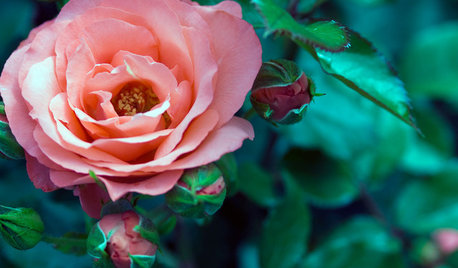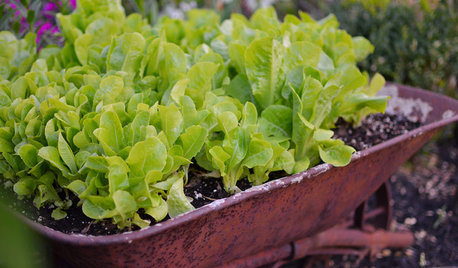Organic fertilizer/better results in container gardening?
amiga
19 years ago
Related Stories

GARDENING GUIDESGet on a Composting Kick (Hello, Free Fertilizer!)
Quit shelling out for pricey substitutes that aren’t even as good. Here’s how to give your soil the best while lightening your trash load
Full Story
BOOKSCan Tidying Up Result in Life-Changing Magic?
Organizing phenom Marie Kondo promises big results — if you embrace enormous changes and tough choices
Full Story
GARDENING FOR BUTTERFLIES3 Ways Native Plants Make Gardening So Much Better
You probably know about the lower maintenance. But native plants' other benefits go far beyond a little less watering and weeding
Full Story
GARDENING GUIDESLearn the Secret to Bigger and Better Roses
Grow beautiful roses using both ordinary and unusual soil amendments
Full Story
GARDENING GUIDESHow to Switch to an Organic Landscape Plan
Ditch the chemicals for a naturally beautiful lawn and garden, using living fertilizers and other nontoxic treatments
Full Story
GARDENING GUIDESCommon Myths That May Be Hurting Your Garden
Discover the truth about fertilizer, soil, staking and more to keep your plants healthy and happy
Full Story
GARDENING GUIDESHow to Keep Your Citrus Trees Well Fed and Healthy
Ripe for some citrus fertilizer know-how? This mini guide will help your lemon, orange and grapefruit trees flourish
Full Story
FARM YOUR YARDHow to Grow Vegetables in Containers
Get glorious vegetables and fruits on your patio with a pro’s guidance — including his personal recipe for potting mix
Full Story
FEEL-GOOD HOMEIs Your Bedroom Designed for a Good Night’s Sleep?
Find out how the right nightstands, bedding, rugs, TV and storage can help you get more restful slumber
Full Story
FARM YOUR YARD10 Easy Edibles to Grow in Containers
These herbs, vegetables and fruits are just as happy in a pot as they are in the ground
Full StorySponsored






mich_in_zonal_denial
Ron_B
Related Professionals
Glassmanor Landscape Architects & Landscape Designers · Glen Ellyn Landscape Architects & Landscape Designers · Rossville Landscape Architects & Landscape Designers · Maple Heights Landscape Architects & Landscape Designers · Stamford Landscape Contractors · Cupertino Landscape Contractors · Eureka Landscape Contractors · Indianapolis Landscape Contractors · Palm Beach Gardens Landscape Contractors · Ronkonkoma Landscape Contractors · White Bear Lake Landscape Contractors · Chattanooga Driveway Installation & Maintenance · Concord Driveway Installation & Maintenance · Greensboro Driveway Installation & Maintenance · Leesburg Driveway Installation & MaintenanceOrganic_johnny
lazy_gardens
sally2_gw
organicbuddy710
pickwick